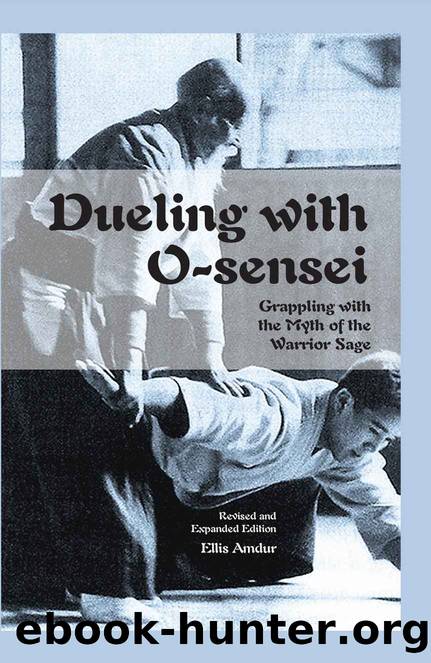Dueling with O-sensei by Ellis Amdur

Author:Ellis Amdur [Amdur, Ellis]
Language: eng
Format: epub
Publisher: Freelance Academy Press
Published: 2016-09-14T22:00:00+00:00
What is to be done with abuse?
From the time my children were very small, Iâlike so many parentsâbegan to teach them about not trusting strangers. I taught them a secret code word, without which, they should never accompany anyone, even if they said their mother or I were sick or injured. It hurt my heart to damage their natural trust in other people, but I hadnât stolen their innocence at all. It was those who would hurt my sons, not I. When my younger son was about four-and-a-half, someone tried to kidnap him. He bit his way free. Without his courage as well as my teaching him how to defend himself, where would that child be today?
I am occasionally invited to teach aikidÅ seminars. What I often do is similar to what I did for my children. I often try to open my studentâs eyes, at the expense, perhaps, of their innocence. I teach ukemi. The entire weekend is a dissection of falling, from the very first movements, because many people have learned to fall quite incorrectly. They end up injuring themselves. I teach how to take ukemi in such a way that one can always take a breakfall. An ushiro ukemi, where one falls backwards, is a conscious choice only taken when assured, in the middle of that technique, that one is safe.
In the course of such a training seminar, almost everyone there learns to take at least limited breakfalls from all the major throws in the compendium of aikidÅ techniques, including hip throws. During this time, instruction on techniques is limited to what is necessary to set up the proper circumstances to learn to fall in a particular manner. What I teach is to take no one for granted. From a martial perspective, it is disrespectful, if not suicidal, to regard an opponent as less than dangerous. You are insulting your training partner if you fall in a manner in which you do not protect yourselfâat least if you know how to do so.
The proper manner of ukemi also sets you up to reverse your opponentâs technique. Without the ability to do counter-techniques, I do not believe that one is truly effective in aikidÅ.
You are, thereby, at least somewhat prepared for both the malevolent and the inept. You only have to protect yourself once, because you donât have to give them a second chance.80
Which brings me to my next pointâthe art of departure. Decide beforehand that you will never accept someone willfully hurting you if it is in your power to stop it. If a fellow student, junior or senior, tries to harm you, take an effective fall to counter this, get up, look them in the eye and say, âI donât want to practice with you anymore.â Depending on their response and your personal inclination, you can then reply, âBecause you tried to hurt me,â or âYou know why,â or simply walk away and find someone else to practice with. You can also say, âDonât ever try to practice with me again,â if the act was particularly reprehensible.
Download
This site does not store any files on its server. We only index and link to content provided by other sites. Please contact the content providers to delete copyright contents if any and email us, we'll remove relevant links or contents immediately.
The Vikings: Conquering England, France, and Ireland by Wernick Robert(79146)
Ali Pasha, Lion of Ioannina by Eugenia Russell & Eugenia Russell(39917)
The Vikings: Discoverers of a New World by Wernick Robert(36823)
The Conquerors (The Winning of America Series Book 3) by Eckert Allan W(36687)
Cecilia; Or, Memoirs of an Heiress — Volume 1 by Fanny Burney(32061)
Cecilia; Or, Memoirs of an Heiress — Volume 3 by Fanny Burney(31456)
Cecilia; Or, Memoirs of an Heiress — Volume 2 by Fanny Burney(31408)
Empire of the Sikhs by Patwant Singh(22763)
Hans Sturm: A Soldier's Odyssey on the Eastern Front by Gordon Williamson(18325)
The Secret History by Donna Tartt(18160)
Cat's cradle by Kurt Vonnegut(14758)
Sapiens: A Brief History of Humankind by Yuval Noah Harari(13987)
Pimp by Iceberg Slim(13777)
Talking to Strangers by Malcolm Gladwell(12869)
Norse Mythology by Gaiman Neil(12826)
Leonardo da Vinci by Walter Isaacson(12801)
Underground: A Human History of the Worlds Beneath Our Feet by Will Hunt(11837)
4 3 2 1: A Novel by Paul Auster(11788)
The Radium Girls by Kate Moore(11621)
